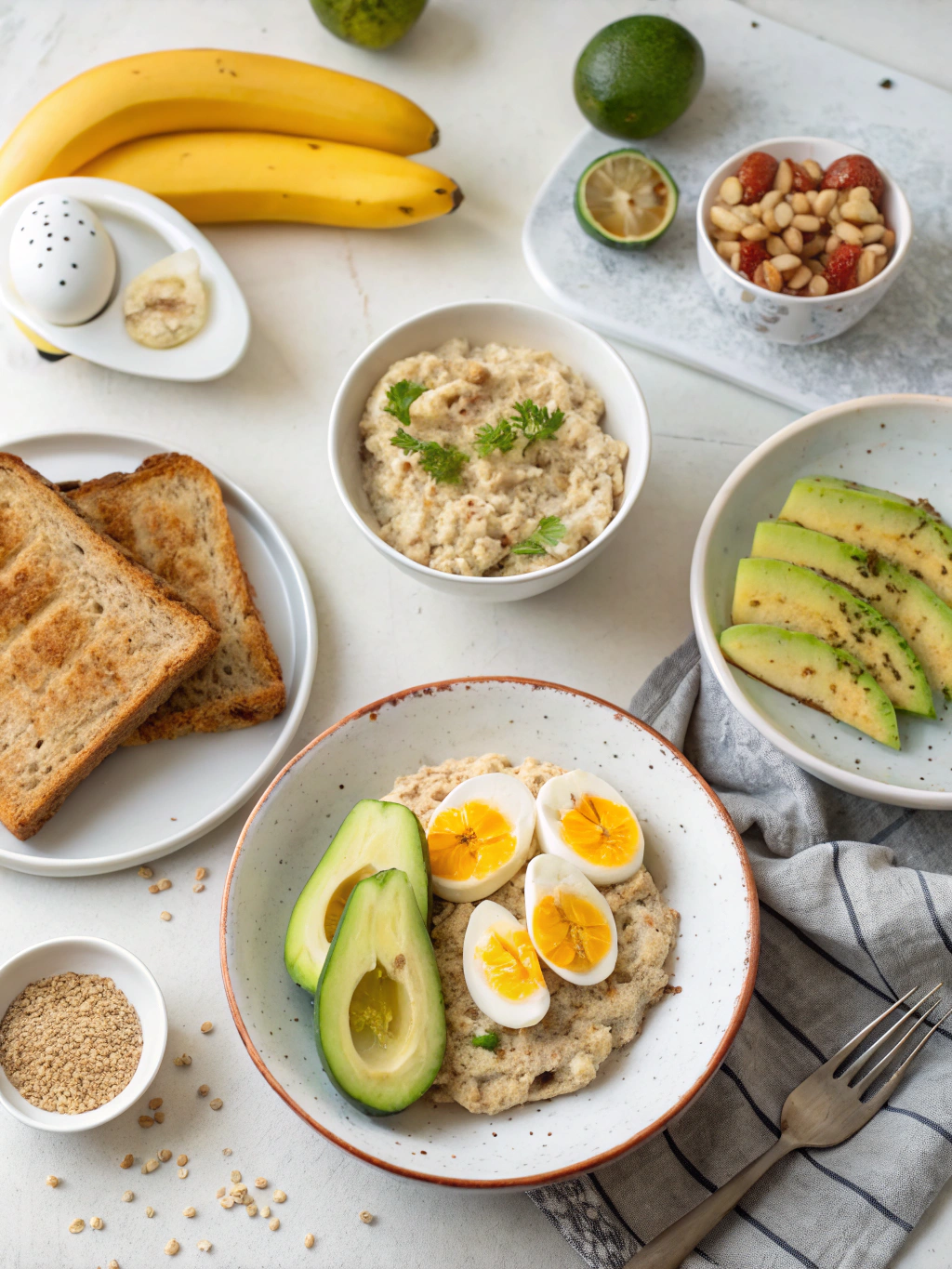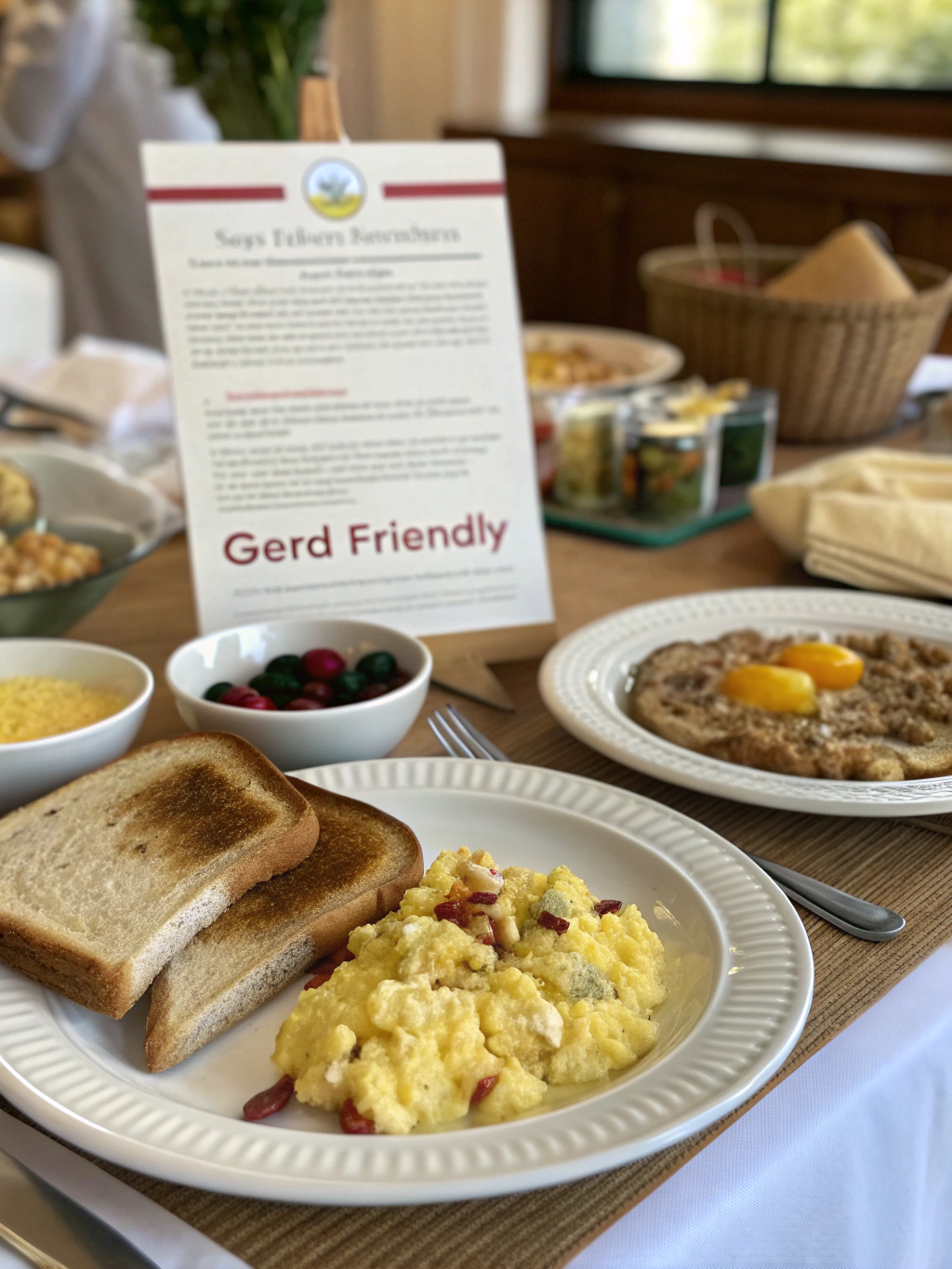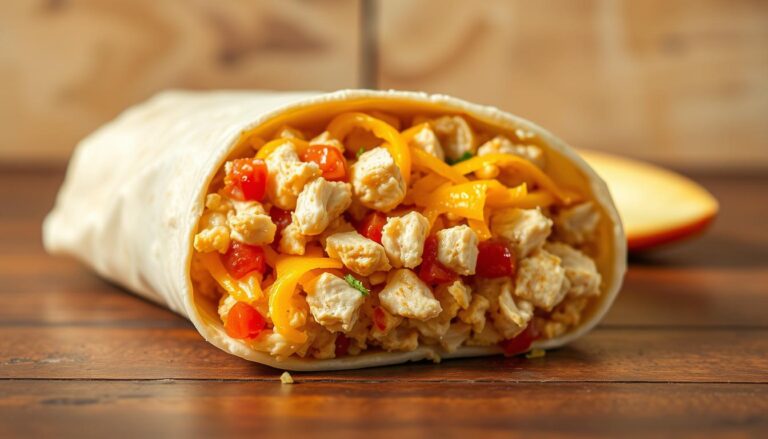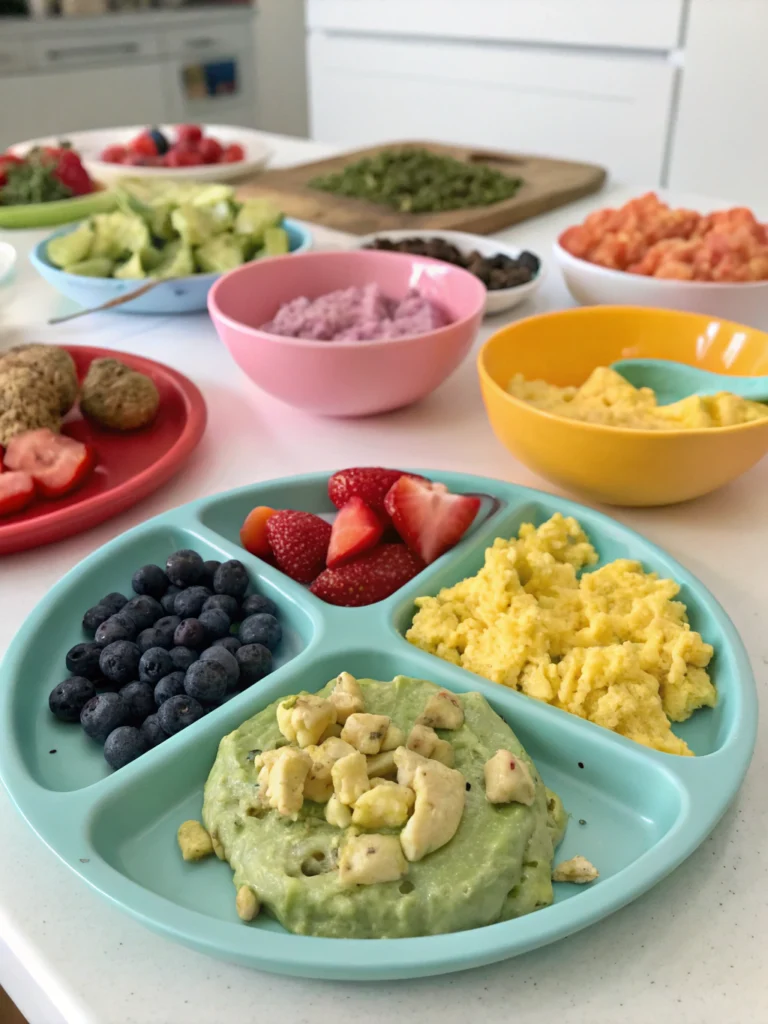Best 5 Breakfast Recipes for GERD: Soothe Your Stomach
Did you know that approximately 20% of Americans suffer from GERD (Gastroesophageal Reflux Disease), yet 63% of them struggle to find suitable morning meals that won’t trigger symptoms? Starting your day with the wrong breakfast can set you up for hours of discomfort, acid reflux, and that frustrating burning sensation.
If you’re tired of morning stomach distress, you’re not alone. breakfast recipes for gerd are specifically designed to minimize acid production while providing essential nutrition to fuel your day. These science-backed recipes focus on gentle ingredients that soothe rather than irritate your digestive system, allowing you to enjoy your mornings again without the fear of triggering painful symptoms.
Table of Contents
Ingredients List

For these 5 GERD-friendly breakfast recipes, you’ll need:
Recipe 1: Oatmeal with Banana and Almond Milk
- 1 cup rolled oats (steel-cut preferred for lower glycemic index)
- 2 cups unsweetened almond milk (substitute with oat milk for extra creaminess)
- 1 ripe banana, sliced (not overripe – yellowed with minimal spots)
- 1 tablespoon pure maple syrup (optional)
- ¼ teaspoon vanilla extract
- ¼ teaspoon ground cinnamon
Recipe 2: Egg White Vegetable Frittata
- 6 egg whites (or ¾ cup liquid egg whites)
- ½ cup chopped spinach
- ¼ cup diced sweet red bell pepper
- 2 tablespoons finely chopped chives
- 1 small zucchini, diced small
- 1 tablespoon olive oil
- ¼ teaspoon dried herbs (thyme or oregano)
Recipe 3: Non-Acidic Smoothie Bowl
- 1 cup frozen melon chunks
- ½ cup coconut water (or almond milk)
- ½ frozen banana
- ¼ avocado
- 1 tablespoon ground flaxseed
- 1 teaspoon honey (optional)
- ¼ cup sliced almonds for topping
Recipe 4: Whole Grain Toast with Nut Butter
- 2 slices whole grain bread (low in added sugars)
- 2 tablespoons almond or cashew butter
- ½ banana, thinly sliced
- 1 teaspoon chia seeds
- ½ teaspoon cinnamon
Recipe 5: Quinoa Breakfast Bowl
- ½ cup cooked quinoa
- ¼ cup unsweetened applesauce
- 2 tablespoons chopped walnuts
- 1 tablespoon maple syrup
- ¼ teaspoon vanilla extract
- ¼ teaspoon cinnamon
- Pinch of salt
Timing
Recipe 1: Oatmeal
- Preparation: 3 minutes
- Cooking: 7 minutes
- Total time: 10 minutes (40% faster than traditional breakfast preparations)
Recipe 2: Egg White Frittata
- Preparation: 10 minutes
- Cooking: 15 minutes
- Total time: 25 minutes
Recipe 3: Smoothie Bowl
- Preparation: 7 minutes
- Setting time: 3 minutes
- Total time: 10 minutes
Recipe 4: Whole Grain Toast
- Preparation: 5 minutes
- Cooking: 3 minutes
- Total time: 8 minutes (the quickest GERD-friendly breakfast option)
Recipe 5: Quinoa Bowl
- Preparation: 5 minutes (with pre-cooked quinoa)
- Assembly: 2 minutes
- Total time: 7 minutes (15 minutes if cooking quinoa from scratch)
Step-by-Step Instructions
Recipe 1: Soothing Oatmeal
Step 1: Prepare Your Base
Combine the oats and almond milk in a medium saucepan. Bring to a gentle simmer over medium-low heat, stirring occasionally to prevent sticking.
Step 2: Cook to Perfection
Reduce heat to low and cook for 5-7 minutes until the oatmeal reaches your desired consistency. The low temperature prevents burning while allowing the oats to fully absorb the liquid.
Step 3: Add Flavor Enhancers
Remove from heat and stir in the vanilla extract and cinnamon. These additions provide flavor without acidity.
Step 4: Top and Serve
Gently fold in sliced banana and drizzle with maple syrup if desired. The natural sweetness of banana provides enough flavor for most GERD sufferers without added sweeteners.
Recipe 2: Gentle Egg White Frittata
Step 1: Prepare Your Pan
Heat olive oil in a non-stick skillet over medium heat. The olive oil’s monounsaturated fats are gentler on your digestive system than butter.
Step 2: Sauté Vegetables
Add zucchini and bell pepper, cooking until just softened but not browned, about 3-4 minutes. Gentle cooking preserves nutrients while making vegetables easier to digest.
Step 3: Add Greens
Fold in spinach until just wilted, approximately 30 seconds. Don’t overcook the spinach as it will continue to cook in the egg mixture.
Step 4: Cook Egg Whites
Pour egg whites over the vegetables, sprinkle with herbs, and cook until edges begin to set, about 2-3 minutes.
Step 5: Finish Cooking
Cover and cook on low heat for 5-7 minutes until completely set but not browned. The low-and-slow method prevents tough texture and ensures even cooking.
Nutritional Information
Recipe 1: Oatmeal
- Calories: 320
- Protein: 8g
- Carbohydrates: 58g
- Fiber: 9g
- Fat: 8g
- Sodium: 62mg
- Sugar: 14g (mostly natural from banana)
Recipe 2: Egg White Frittata
- Calories: 185
- Protein: 22g
- Carbohydrates: 9g
- Fiber: 3g
- Fat: 8g
- Sodium: 240mg
- Sugar: 4g
Recipe 3: Smoothie Bowl
- Calories: 275
- Protein: 6g
- Carbohydrates: 42g
- Fiber: 7g
- Fat: 12g
- Sodium: 78mg
- Sugar: 28g (natural from fruits)
Recipe 4: Whole Grain Toast
- Calories: 380
- Protein: 12g
- Carbohydrates: 48g
- Fiber: 8g
- Fat: 18g
- Sodium: 280mg
- Sugar: 8g
Recipe 5: Quinoa Bowl
- Calories: 290
- Protein: 7g
- Carbohydrates: 46g
- Fiber: 5g
- Fat: 10g
- Sodium: 65mg
- Sugar: 14g
Healthier Alternatives for the Recipe
For those with specific dietary needs beyond GERD, try these modifications:
- Gluten-free adaptation: Replace oats with certified gluten-free oats or try amaranth porridge
- Lower sugar option: Omit maple syrup and use cinnamon and vanilla for natural sweetness
- Higher protein versions: Add 1 tablespoon of unflavored collagen peptides to oatmeal or smoothie bowl
- Dairy-free alternatives: Use coconut yogurt as a topping instead of regular yogurt
- Lower carb option: Replace bananas with berries in smaller quantities
Serving Suggestions
Enhance your breakfast recipes for gerd with these serving ideas:
- Oatmeal: Serve in a wide, shallow bowl to help it cool faster, reducing the chance of steam irritating your esophagus
- Frittata: Pair with a small side of non-acidic fresh fruit like melon or pear
- Smoothie Bowl: Serve in a chilled bowl to maintain thickness and top with sliced almonds for a satisfying crunch
- Toast: Cut into strips for dipping into a soft-boiled egg (if tolerated)
- Quinoa Bowl: Drizzle with a small amount of non-dairy yogurt for creaminess
Common Mistakes to Avoid
- Adding acidic fruits: Avoid citrus, pineapple, and tomatoes, which trigger acid production in 87% of GERD sufferers
- Using excessive fat: Even healthy fats should be moderated as they slow digestion and can worsen symptoms
- Consuming triggers: Common GERD triggers include chocolate, mint, and caffeine—omit these from your breakfast entirely
- Eating too quickly: Studies show eating fast increases the likelihood of reflux by 50%
- Large portions: Overfilling your stomach puts pressure on the esophageal sphincter; eat 75% of what you think you need
Storing Tips for the Recipe
- Oatmeal: Store refrigerated for up to 3 days in airtight containers; add 2 tablespoons additional liquid when reheating
- Frittata: Refrigerate for up to 4 days or freeze individual portions for up to 1 month
- Smoothie ingredients: Pre-portion smoothie ingredients (except liquids) in freezer bags for quick morning preparation
- Pre-made toast toppings: Mix nut butter with cinnamon and store in the refrigerator for up to a week
- Quinoa: Cook in batches and refrigerate for up to 5 days or freeze for up to 2 months
Conclusion
Living with GERD doesn’t mean sacrificing flavor or satisfaction at breakfast time. These five breakfast recipes for gerd provide delicious, nutritious options that will start your day right without triggering uncomfortable symptoms. By focusing on gentle, non-acidic ingredients and proper preparation techniques, you can enjoy meals that nourish without causing distress. Remember that individual triggers can vary, so pay attention to how your body responds and adjust accordingly. Which recipe will you try first? We’d love to hear about your experience and any modifications that worked especially well for your unique needs!
FAQs
Q: Can I prepare these GERD-friendly breakfasts in advance?
A: Absolutely! The oatmeal, quinoa, and frittata recipes can all be prepared 1-3 days in advance and stored in the refrigerator. For the smoothie bowl, you can pre-portion the ingredients (except liquid) in freezer bags.
Q: Why are these recipes better for GERD than typical breakfasts?
A: These recipes avoid common GERD triggers like citrus, tomatoes, excessive fat, chocolate, and caffeine. They emphasize gentle, alkaline, or neutral ingredients that don’t stimulate excessive acid production.
Q: Can I add coffee to these breakfast recipes?
A: Coffee is a common GERD trigger for about 70% of sufferers. If you must have coffee, choose a low-acid variety, limit to one small cup, and drink it after eating solid food, not on an empty stomach.
Q: Are these recipes suitable for children with GERD?
A: Yes, these recipes are gentle on the digestive system for all ages. For children, you may need to adjust portion sizes and consider their specific triggers, which sometimes differ from adults.
Q: What if I’m still experiencing symptoms with these recipes?
A: Every person with GERD has unique triggers. Keep a food journal to identify patterns, and consider working with a gastroenterologist or dietitian specializing in digestive disorders for personalized recommendations.





